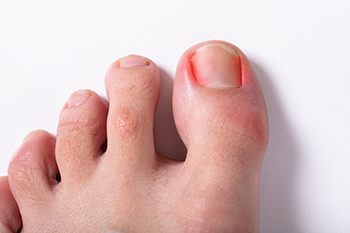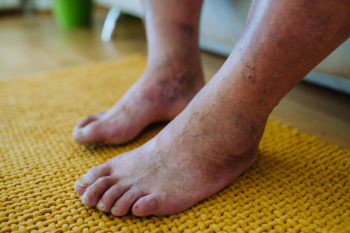Blog
Items filtered by date: April 2025
Improving Balance Can Help Prevent Falls

As people age, changes in the feet, toes, and ankles can increase their risk of falling. Reduced joint flexibility, weaker muscles in the lower legs, and diminished sensation in the soles of the feet all contribute to poor balance. Common foot issues, such as bunions, hammertoes, or flat feet, may alter walking patterns and decrease stability. Limited ankle mobility also affects how the body responds to uneven surfaces or sudden shifts in direction. Even dry or thickened skin on the soles can affect grip and lead to slips. A podiatrist can evaluate these factors and provide care that supports balance. Options include suggesting supportive footwear, addressing biomechanical concerns, and prescribing custom orthotics to correct alignment. In some cases, foot or ankle surgery may be needed to correct structural problems that reduce stability. Strengthening the feet and ankles through guided exercises, along with proper foot care, can play an important role in fall prevention. If you are at risk for falling, it is suggested that you schedule an appointment with a podiatrist for an exam and suggestions for maintaining stability.
Preventing falls among the elderly is very important. If you are older and have fallen or fear that you are prone to falling, consult with one of our podiatrists from Romeo Foot & Ankle Clinic. Our doctors will assess your condition and provide you with quality advice and care.
Every 11 seconds, an elderly American is being treated in an emergency room for a fall related injury. Falls are the leading cause of head and hip injuries for those 65 and older. Due to decreases in strength, balance, senses, and lack of awareness, elderly persons are very susceptible to falling. Thankfully, there are a number of things older persons can do to prevent falls.
How to Prevent Falls
Some effective methods that older persons can do to prevent falls include:
- Enrolling in strength and balance exercise program to increase balance and strength
- Periodically having your sight and hearing checked
- Discuss any medications you have with a doctor to see if it increases the risk of falling
- Clearing the house of falling hazards and installing devices like grab bars and railings
- Utilizing a walker or cane
- Wearing shoes that provide good support and cushioning
- Talking to family members about falling and increasing awareness
Falling can be a traumatic and embarrassing experience for elderly persons; this can make them less willing to leave the house, and less willing to talk to someone about their fears of falling. Doing such things, however, will increase the likelihood of tripping or losing one’s balance. Knowing the causes of falling and how to prevent them is the best way to mitigate the risk of serious injury.
If you have any questions, please feel free to contact our offices located in Washington and Shelby Townships, MI . We offer the newest diagnostic and treatment technologies for all your foot care needs.
Symptoms of an Ingrown Toenail

An ingrown toenail occurs when the edge of the nail grows into the surrounding skin, leading to discomfort and irritation. Early symptoms include tenderness and redness along the side of the nail. As the condition progresses, swelling and increased pain may develop, especially when pressure is applied. The affected area may feel warm and become sensitive to touch. In some cases, the skin around the nail may appear swollen or inflamed due to irritation. If left untreated, an infection can form, leading to pus drainage and more intense pain. Walking or wearing shoes may become uncomfortable as the nail continues to press into the skin. If you have any of the above symptoms, it is suggested that you schedule an appointment with a podiatrist who can accurately diagnose and treat ingrown toenails.
Ingrown toenails can become painful if they are not treated properly. For more information about ingrown toenails, contact one of our podiatrists of Romeo Foot & Ankle Clinic. Our doctors can provide the care you need to keep you pain-free and on your feet.
Ingrown Toenails
Ingrown toenails occur when a toenail grows sideways into the bed of the nail, causing pain, swelling, and possibly infection.
Causes
- Bacterial infections
- Improper nail cutting such as cutting it too short or not straight across
- Trauma to the toe, such as stubbing, which causes the nail to grow back irregularly
- Ill-fitting shoes that bunch the toes too close together
- Genetic predisposition
Prevention
Because ingrown toenails are not something found outside of shoe-wearing cultures, going barefoot as often as possible will decrease the likeliness of developing ingrown toenails. Wearing proper fitting shoes and using proper cutting techniques will also help decrease your risk of developing ingrown toenails.
Treatment
Ingrown toenails are a very treatable foot condition. In minor cases, soaking the affected area in salt or antibacterial soaps will not only help with the ingrown nail itself, but also help prevent any infections from occurring. In more severe cases, surgery is an option. In either case, speaking to your podiatrist about this condition will help you get a better understanding of specific treatment options that are right for you.
If you have any questions please feel free to contact our offices located in Washington and Shelby Townships, MI . We offer the newest diagnostic and treatment technologies for all your foot and ankle needs.
Wounds That Don't Heal Need to Be Checked
Taking Care of Your Diabetic Feet

Proper foot care is imperative for people with diabetes, as the condition can lead to poor circulation, nerve damage, and increased risk of infections. Symptoms like numbness, tingling, or a loss of sensation in the feet can make it difficult to notice injuries or sores. Diabetes can also cause skin changes, making the feet more prone to cuts, blisters, or fungal infections. To protect your feet, it is important to regularly check for sores, cuts, or blisters, and keep your feet clean and dry. Wearing well-fitting shoes, avoiding walking barefoot, and moisturizing dry skin can help prevent issues. If you smoke, it is important to stop, as smoking worsens circulation and increases the risk of complications. A podiatrist can help with regular foot exams, treating infections, and providing advice on proper footwear and diabetic foot care. If you are diabetic and have foot issues, it is suggested that you are under the care of a podiatrist, who can regularly monitor this condition.
Diabetic foot care is important in preventing foot ailments such as ulcers. If you are suffering from diabetes or have any other concerns about your feet, contact one of our podiatrists from Romeo Foot & Ankle Clinic. Our doctors can provide the care you need to keep you pain-free and on your feet.
Diabetic Foot Care
Diabetes affects millions of people every year. The condition can damage blood vessels in many parts of the body, especially the feet. Because of this, taking care of your feet is essential if you have diabetes, and having a podiatrist help monitor your foot health is highly recommended.
The Importance of Caring for Your Feet
- Routinely inspect your feet for bruises or sores.
- Wear socks that fit your feet comfortably.
- Wear comfortable shoes that provide adequate support.
Patients with diabetes should have their doctor monitor their blood levels, as blood sugar levels play such a huge role in diabetic care. Monitoring these levels on a regular basis is highly advised.
It is always best to inform your healthcare professional of any concerns you may have regarding your feet, especially for diabetic patients. Early treatment and routine foot examinations are keys to maintaining proper health, especially because severe complications can arise if proper treatment is not applied.
If you have any questions please feel free to contact our offices located in Washington and Shelby Townships, MI . We offer the newest diagnostic and treatment technologies for all your foot and ankle needs.
Blog Archives
- April 2025
- March 2025
- February 2025
- January 2025
- December 2024
- November 2024
- October 2024
- September 2024
- August 2024
- July 2024
- June 2024
- May 2024
- April 2024
- March 2024
- February 2024
- January 2024
- December 2023
- November 2023
- October 2023
- September 2023
- August 2023
- July 2023
- June 2023
- May 2023
- April 2023
- March 2023
- February 2023
- January 2023
- December 2022
- November 2022
- October 2022
- September 2022
- August 2022
- July 2022
- June 2022
- May 2022
- April 2022
- March 2022
- February 2022
- January 2022
- December 2021
- November 2021
- October 2021
- September 2021
- August 2021
- July 2021
- June 2021
- May 2021
- April 2021
- March 2021
- February 2021
- January 2021
- December 2020
- November 2020
- October 2020
- September 2020
- August 2020
- July 2020
- June 2020
- May 2020
- April 2020
- March 2020
- February 2020
- January 2020
- December 2019
- November 2019
- October 2019
- September 2019
- August 2019
- July 2019
- June 2019
- May 2019
- April 2019
- March 2019
- February 2019
- January 2019
- December 2018
- November 2018
- October 2018
- September 2018
- August 2018
- July 2018
- June 2018
- May 2018

